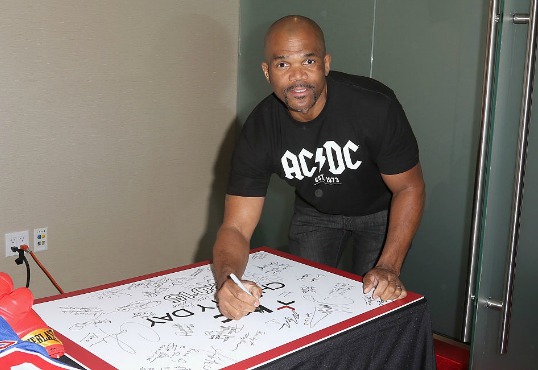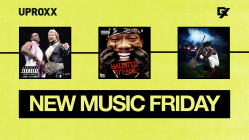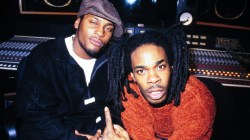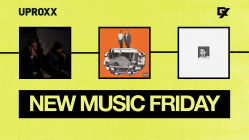Run-DMC were not only the genre’s first superstars and creators of the first Hip Hop classic album, they also set the precedence for the machismo found in Hip Hop. The trio consisting of Russell Simmons’ brother Joseph “Run” Simmons (now known universally as Reverend Run), Darryl “DMC” McDaniels and the late Jam Master Jay rarely smiled, pioneered fashion through leather jackets and adidas® Shell Toes and made Hip Hop classics hard enough for both rock and rap fans.
Beneath the surface, the dark side of fame was suppressing the toughened exterior DMC had popularized, as he admits in his new memoir, Ten Ways Not to Commit Suicide, he was close to taking his own life after bouts with alcohol addiction and coping how the loss of his voice from the throat condition spasmodic dysphonia would affect his life and career altogether.
“I was probably at my suicidal worst in 1997 during a two-week-long tour in Japan,” McDaniels writes in the book, exclusively excerpted by People. “The only song I listened to then was a soft-pop ballad by Sarah McLachlan called ‘Angel.'”
“I thought long and hard about killing myself every day in Japan. I tricked myself into thinking that my family might be better off without me. I considered jumping out of a window. I thought about going to a hardware store to buy poison to ingest. I thought about putting a gun to my temple. Whenever I’d listen to ‘Angel,’ though, I always managed to make my way back from the brink.”
Although the artist name and song may not accessibly be at the tip of most Run-DMC (and rap fans for that matter) tongues, there’s an almost guaranteed chance they’ve heard it. Not only did the song enjoy a twenty-nine week on the Billboard Top 100 back in the late 90s, in 2007, it became the theme for those tearjerking American Society for the Prevention of Cruelty to Animals (ASPCA) PSA’s (where McLachlan also served as the spokesperson).
DMC — who first heard the record while riding in a cab circa 1996 — had used the song as a crutch a decade before that.
“I cannot overemphasize how important that song was to me in the midst of my depression. ‘Angel’ kept me serene even when every fiber of my person was screaming for me to lose it [and] made me believe that I could soldier through,” the excerpt continues.
“Whatever my hesitations about suicide, I sometimes think I would have done the deed easily if it weren’t for that record.”
Today, DMC, 52, is healthy, sober and dedicates his time to his charity The Felix Organization, where he mentors youth who come up in the foster care system.
The new issue of People is currently on newsstands which digs deeper into the rap legend’s relationship with his biological mother after he found out he was adopted later in life.
Ten Ways Not to Commit Suicide will be available everywhere on July 5.








I wish I was dead too. Life ain’t fun when your health is over. Euthanasia needs to be legal worldwide. Nembutal is hard or almost impossible to obtain for me. Life sucks. Suicide is tha only way out from this failed life.
He also writes comics. He has 2 volumes out. They’re dope comics. Highly recommended. Wish DX would have mentioned that.
hopefully Darryl will go on a high profile book signing tour. He also deserves to have a new record deal and to come out with new solo albums.
Shout out to Detroit journalist Darryl Dawsey, who ghostwrote the book.
Thats whats wrong, the perception that those that listen to RAP or HIP-HOP Don’t have eclectic tastes…if you really love music..then they’re all just flavors…those who define themselves by an artist or genre…should be labeled “Whats wrong with the world”
Just read the People article and wanted to reach out. I share your spasmodic dysphonia and receive Botox 4x annually but I have to believe there is more I can do. I had to make some life changes since sales is hard to manage when your voice is good only one full month or maybe two out of three. As you are aware. Can you please share how you manage the disorder? I am always seeking info on how others handle it when actually correctly disagnosed. If this is detailed in your book please advise! I saw recently that Diane Rhem of PBS fame also has voice coach in CA. Many thanks for all you do.